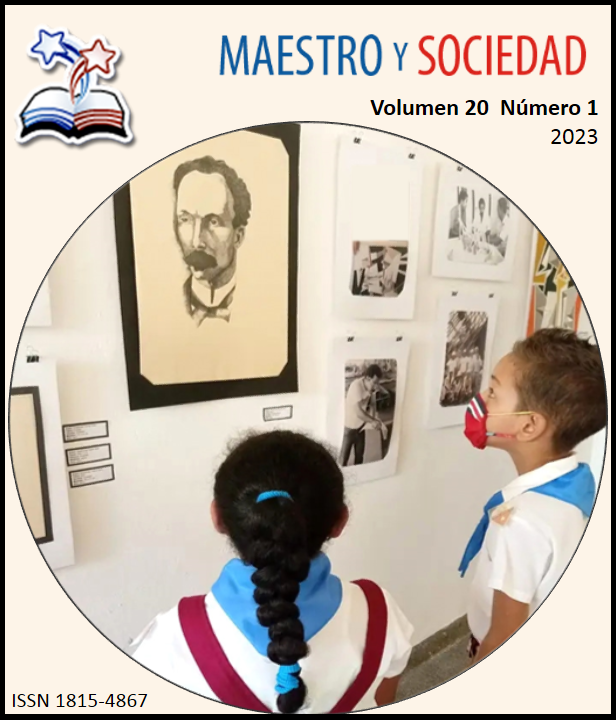Hybrid model of professional training and self-management of learning: need and challenge
Hybrid model of professional training and self-management of learning: need and challenge
Keywords:
Hybrid model of professional training, developer teaching learning process, learning self-managementAbstract
Introduction: The COVID-19 pandemic has modified all aspects of social life, and led to a rethinking of ways of living. In the case of professional training, experiences with the implementation of distance education and long-standing face-to-face education in universities have advised assessing the need and relevance of implementing the hybrid training model.
Materials and methods: This article analyzes the challenges that this implies and proposes how to promote self-management of learning in the new context based on bibliographic analysis, the assessment of pedagogical experiences of the educational community, as surveys of University State Peninsula of Santa Elena students.
Results: The face-to-face and distance models that should be in the hybrid model are autonomous and self-located learning, collaboration, evaluation and the use of support materials in different supports. In the texts examined, there is a coincidence that both distance and hybrid education have potential for self-management of learning, since in both the process is centered on learning, which favors autonomous, meaningful, and collaborative learning.
Discussion: The hybrid model of education constitutes not only a necessity but also a didactic alternative that allows combining the possibilities offered by the face-to-face model and distance education for self-managed learning.
Conclusions: The implementation of the hybrid training model opens up a wide range of possibilities for the training process to promote self-management of learning, but at the same time it poses a challenge for universities and their cloisters.
References
Addine Fernández, F. (Compiladora) (2005). Didáctica teoría y práctica. Editorial Pueblo y Educación.
Álvarez, V. (2021). Utilización de los entornos virtuales de enseñanza aprendizaje por los docentes de la carrera de Medicina. Maestro y Sociedad, 18(4), 1252-1258. https://maestroysociedad.uo.edu.cu/index.php/MyS
Atúncar, C. y Medina, P. (2021) La virtualización educativa: retos en la formación inicial docente. Maestro y Sociedad, 18(3), 984-1000. https://maestroysociedad.uo.edu.cu/index.php/MyS
Bejarano P., Leiva, Rojas y Narro (2021). Revisión teórica de la educación en la modalidad virtual. Maestro y Sociedad, 18(1), 241-253. https://maestroysociedad.uo.edu.cu/index.php/MyS
Cervantes G., García y Díaz (2021). Experiencias en el uso de la Tecnología Educativa en el período Covid-19 en la Universidad de Oriente. Maestro y Sociedad, 18(2), 747-756. https://maestroysociedad.uo.edu.cu/index.php/MyS
Colectivo de autores. (2017). Modelo de Educación a Distancia de la Educación Superior Cubana. (s.e.).
Contreras M. (1999). Educación abierta y a distancia. Alternativa de autoformación para el nuevo milenio. Ediciones Hispanoamericanas.
Criollo, V., Calderón, Ruiz y Tuesta, A. (2021). Rol del Perú frente a la educación virtual y nuevos desafíos por la pandemia Covid-19. Maestro y Sociedad, 18(3), 1105-1119. https://maestroysociedad.uo.edu.cu/index.php/MyS
García Aretio, L. (2021). COVID-19 y educación a distancia digital: preconfinamiento, confinamiento y posconfinamiento. RIED. Revista Iberoamericana de Educación a Distancia, 24(1), 09-32. http://dx.doi.org/10.5944/ried.24.1.28080
García, C. (2002). La formación inicial y permanente de los educadores. Extraído del libro: Consejo Escolar del Estado Los educadores en la sociedad del siglo XXI. Ministerio de Educación, Cultura y Deporte.
Góngora, J. (2005). La autogestión del aprendizaje en ambientes educativos centrados en el alumno. http://www.itesm.mx/va/dide2/documentos/autogestion.pdf
Gutiérrez-Salomón, J. A., Pizá-Gutiérrez, R. I., Tapia-Ruelas, C. S. y Lozano-Rodríguez, A. (2021). Integración de herramientas tecnológicas en los procesos de enseñanza y aprendizaje por profesores de educación superior en el marco de la contingencia por COVID-19. Santiago, (157), 208–222. https://santiago.uo.edu.cu/index.php/stgo/article/view/5470
Laje Terán, C. D., Gualpa Santana, M. L. y Zapata Jaramillo, C. J. (2022). Analfabetismo digital docente en el proceso de enseñanza-aprendizaje de la Unidad Educativa San Carlos. Maestro y Sociedad, 19(1), 334-347. https://maestroysociedad.uo.edu.cu/index.php/MyS
Montes, U. (2022). El acompañamiento docente universitario en la educación semipresencial. Maestro y Sociedad, 19(1), 318-333. https://maestroysociedad.uo.edu.cu/index.php/MyS
Morante Dávila, M. A., Angulo Cárdenas, M., García Camacho, O. E. y Arango Miranda, F. (2021). El control de gestión de las autoridades en la educación virtual universitaria en Perú. Maestro y Sociedad, 18(4), 1460-1473. https://maestroysociedad.uo.edu.cu/index.php/MyS
Moro Ortiz, A. M., Salgado Castillo, A. y Gorina Sánchez, A. (2021). Desafíos actuales de la gestión del conocimiento para el proceso educativo universitario. Maestro y Sociedad, 18(2), 721-731. https://maestroysociedad.uo.edu.cu/index.php/MyS
ONU. (2015). Transformar nuestro mundo: la Agenda 2030 para el Desarrollo Sostenible. https://www.un.org/sustainabledevelopment/es/2015/09/la-asamblea-general-adopta-la-agenda-2030-para-el-desarrollo-sostenible/
Osorio, A. (2010). Características de los ambientes híbridos de aprendizaje: estudio de caso de un programa de posgrado de la Universidad de los Andes. Revista de Universidad y Sociedad del Conocimiento, 7(1), 1-9. https://www.redalyc.org/pdf/780/78012953004.pdf
Sierra, C. (2012). Educación virtual, aprendizaje autónomo y construcción de conocimiento. Editorial Politécnico Grancolombiano.
Tuesta Panduro, J. A. (2021). Las Tecnologías de la Información y Comunicación, competencias investigativas y docencia universitaria: revisión sistemática. Maestro y Sociedad, 18(2), 440-456. https://maestroysociedad.uo.edu.cu/index.php/MyS
Viñas, M. (2021). Retos y posibilidades de la educación híbrida en tiempos de pandemia. Revista Plurentes. Artes y Letras, 12(27). http://portal.amelica.org/ameli/jatsRepo/186/1862378014/index.html
Downloads
Published
How to Cite
Issue
Section
License
Copyright (c) 2023 Gregory Edison Naranjo Vaca, Giselle Aurelia Rodríguez Caballero, Ricardo Javier Rodríguez Alzamora

This work is licensed under a Creative Commons Attribution-NonCommercial-NoDerivatives 4.0 International License.
This journal provides immediate open access to its content, based on the principle that offering the public free access to research helps a greater global exchange of knowledge. Each author is responsible for the content of each of their articles.



























 Universidad de Oriente
Universidad de Oriente 